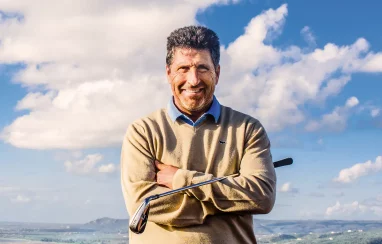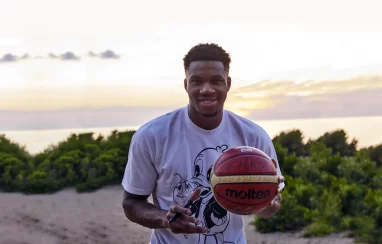By Giorgos Tsiros
As a journalist, it’s hard to think of a subject that one wouldn’t want to discuss with Mark Thompson. The former President and CEO of The New York Times Company and, before that, Director-General of the BBC seems to be something of a seer when it comes to the media; at The New York Times, he earned the historic news outlet millions of new subscribers by foreseeing readers’ willingness to pay for quality journalism online. He appears to have figured out a way to combat the “fake news” phenomenon with real news, and he even seems to have predicted journalists getting on platforms like Clubhouse, writing at mckinsey.com in August 2020: “Podcasting and audio point to a future where the consumption of news and journalism may be more interactive […] ultimately, it may become interrogatory, where the way you get news is by asking questions and getting answers.”
But Thompson isn’t all about predicting future trends – he’s interested in the past as well. When we met a few years back, during the Democracy Weekend hosted by Costa Navarino, within the framework of the annual Athens Democracy Forum in 2017, he had just returned, full of excitement, from touring the nearby archeological sites, and we put current issues aside for a bit.
You’ve been to the Palace of Nestor, the wise king of Pylos described in Homer’s Odyssey, as well as to Ancient Messene, one of the first democratically laid out cities, which offered equal land apportionment and equal access to civic and religious buildings. Can you share your impressions?
The first thing that strikes me is that it’s very strange, isn’t it, to go to places like that and try to work out what the lives of the people who lived there might have been like. I know that concepts such as Ancient Messene’s isonomia, equality before the law, didn’t imply equality of income. Ancient Messene did have very rich people and poor people and slaves, and so on. However, you do get a flavor of the quality of life, which at least, the more privileged enjoyed, which included sports and entertainment as well as work, all in an amazing landscape, a place where, at least in times of peace, people could live very fulfilled, balanced lives. What’s also interesting is that olive production here has been continuous since the time of these ancient monuments, and even now you see great groves of olive trees.
In this particular area of Greece, as you travel along these rural roads between the archeological sites and see those ancient olive groves, it seems like everything that’s wrong in the world is so far away, doesn’t it?
Indeed, the fact that Greece today is still experiencing significant difficulties is not immediately apparent here. As you know, I’ve been in Athens, and it’s much more obvious there. This region, however, is an amazing part of the world, one which feels essentially unspoiled, unlike so many parts of the Mediterranean coast that have been intensely developed. It’s still sparsely populated and the villages seem to be working villages, not places filled with tourist shops. It’s wonderful.
You’ve probably heard about how Costa Navarino is the result of the vision of Captain Vassilis Constantakopoulos, who found a way to keep young people here by creating jobs in their home region…
Presumably, the lack of opportunity was a problem here. Although the quality of life is wonderful and tourists love to see the continuity of this way of life, if you’re 18 to 25, what kind of job can you get? This kind of carefully considered, ecologically sensitive tourism development seems very appropriate for the region, and it offers work.
But getting to the subject of the world today, what’s your outlook on Greece?
I think that Greece is a really important European country. You only have to look at the map of the world to see where Greece stands. It will probably continue to be one of the frontline countries in the context of migration, and it’s going to need support from the rest of Europe. It is of paramount importance that Greece, unlike some other countries, remains a full member of the EU and that it’s properly supported by the rest of Europe. It is also very important that Europe as a whole, and the rest of the Northern or Western world, including North America, try and do what they can to address the fundamental issues in the Middle East and North Africa which are leading people to move. In the end, by the time you’ve got people on ships, or you’ve got people trying to move out of a country because their world is broken down and they fear for their families’ lives, it’s already too late. I mean, you do what you can, but by then you’re already in a world of refugee camps and all that comes with that.
You’ve made the point about anyone being able to become a journalist by just using social media and their smartphone. Isn’t that a problem? Aren’t professionalism and codes of ethics the things that separate quality from noise?
I do believe that quality comes from quality, not from the fact that you’ve got a camera and I haven’t. We all know that Richard Avedon or Irving Penn could take a much better photograph than I could take, even if I had a $20,000 camera. It’s in the head, in innate skills, and in training and experience. In a weird way, I think the fact that so many people are trying to make news content will mean that their appreciation of great quality professional content is going to grow.
During your stay here, you’ve sampled both Greek hospitality and Greek gastronomy, which seem to be the main driving forces of our economy right now, and the reason many people travel to Greece. What are your thoughts?
Although much remains to be resolved, I have heard a lot more optimism about the Greek economy. There is a feeling that things will soon begin to move in a positive direction. As for Greek gastronomy, well, it’s one of the world’s great cuisines. The style of food, based on wonderful ingredients and classic methods of preparation, is very much to my taste, as is the olive oil in this region, and the quality of modern Greek wines, which have greatly improved over the years.
Every aspect of what is happening here, at this destination, especially in terms of quality and sustainability, reminds me of what we’ve been talking about with regards to Ancient Messene and Nestor’s Palace. It’s all about getting back to the ideal of a simple life to be led in this beautiful place and living off the bounty of the earth: the wine, olive oil, bread, cheese and local meat. So, it’s a great place to be.
[Edited version of an interview published in Costa Navarino Stories, Issue 07]

